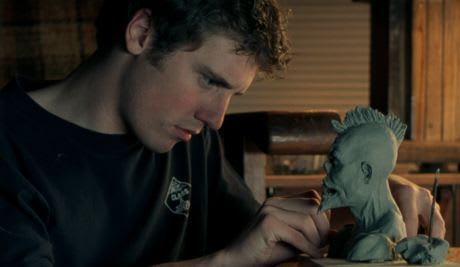In basic terms, Robert Hall's semiautobiographical, Southern gothic, coming-of-age bit of Americana, Lightning Bug, is a standard underdog story reiterating the superficial tenets of Western mythology. Green Graves (Bret Harrison), a trailer-bound teenager living in Alabama, after his unemployed single mother moves him and his brother there from Detroit, has little prospects of a future beyond factory work and inflated posturing at the local watering hole. But, in acknowledging the vague superhero male fantasy ethos America was founded upon, he has a special skill that distinguishes him from others, which, in cinematic terms, means eventual success and social acknowledgement, should he manage to escape the confines of his small-town existence. Green is obsessed with the makeup effects and gore he sees in horror films. Taking tips from Fangoria magazine and the abundance of emotionally simplistic, visceral VHS tapes he rents from the local video store, he practices his craft, making moulds of animals and humans to create monsters and various bodily distortions. With unintentional irony, his emotionally broad and sensationalist preoccupation with exaggerated grotesquery is vilified by the church, dismissed as satanic and unwholesome — "a real artist would use his gifts to create an image of Jesus" — leaving him martyred by locals and mocked by the white trash contingent. In particular, his mother's (Ashley Laurence) alcoholic, sociopath boyfriend, Earl (Kevin Gage). It's this rigidly defined, morally sanctimonious depiction of male belief structures and archetypes that makes Lightning Bug unintentionally laughable in its assertions. Our protagonist, Green, a boy retreating into a reductionist concept of the human experience — that of horror and violence, free from subtlety and introspection — is depicted as an altruistic saint in comparison to those with a similarly simplified and rigid disposition: the working man and the church. The argument here is one of arbitrary rightness, where the only complex thinkers and identifiable human beings are those that embrace and accept the dominant worldview and set of priorities shared by the main character. It's this solipsism that ultimately hinders a work that has the potential to delve into the confining realities of class system segregation and living on the social periphery. Rather than focus on the daily experience of living in a trailer in a rural environment, contemplating the nature of hope and the human spirit in relation to repression and perpetual disappointment, the emotions on display are overly simplified, existing only when a huge, sensationalistic act occurs. Aside from extreme acts of violence, which are tastefully left off camera, for the most part, there is little nuance or intricate humanity on display. The only things that matter here, much like the horror films Green is obsessed with, are broad, clumsily asserted life events like death and life-defining actions. In such, it's difficult to distinguish or appreciate any of the characters or their experiences with the power or connection intended. Everyone is drawn as either good or bad, suggesting that the guiding mindset is trapped in a youthful cycle of right and wrong. The "Making of" and "Look Back" included with the Blu-Ray don't discuss the depiction of worldview so much as they talk about how wonderful the script was and how surprised everyone was that a special effects and makeup artist would make a coming-of-age drama. There's also an extended version of the film included with the Blu-Ray, which merely exacerbates the already problematic pacing issues.
(Anchor Bay)Lightning Bug [Blu-Ray]
Robert Hall

BY Robert BellPublished Feb 7, 2013